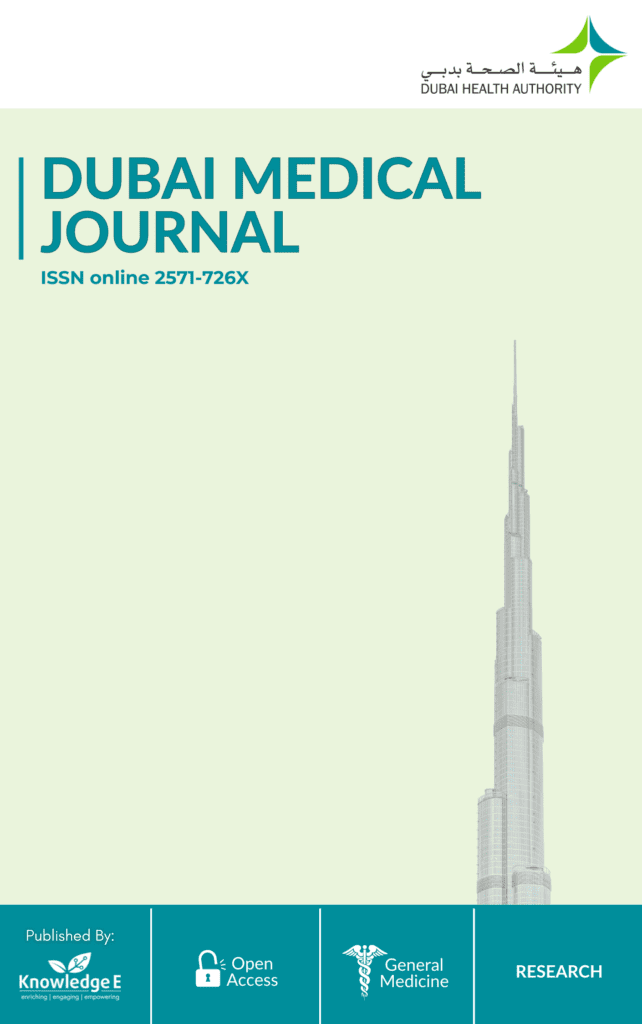
Dubai Medical Journal
ISSN: 2571-726X
Pioneering research in medicine, health sciences, nursing, pharmaceuticals, and laboratory work
The Assessment of Students’ Perception Regarding the Learning Experience in the Virtual Pharmacology Laboratory
Published date:Mar 24 2025
Journal Title: Dubai Medical Journal
Issue title: Dubai Medical Journal (DMJ): Volume 8, Issue 1
Pages:73 - 83
Authors:
Abstract:
Objective: The current study was conducted to evaluate students’ feedback on the virtual pharmacology classes among the second-year students in Faculty of Medicine, Northern Border University, Saudi Arabia.
Materials and Methods: The study was conducted through distribution of a structured self-administered questionnaire of three sections covering satisfaction of participants regarding the virtual pharmacology classes, their effect on students’ performance, and the attitude of students toward the virtual classes.
Results: A total of 152 responses were enrolled in the study. The number of female and male participants were 78 (51.3%) and 74 (48.7%), respectively. The overall answers of the respondents were satisfactory for the different sections with an overall average score of 3.4 (ranging from 3.3 to 3.47). Paired t-test revealed a statistically significant difference between male and female responses (p<0.0001). Male participants showed higher levels of satisfaction in all questions with an average response of 3.7 while the female participants showed an average satisfaction level of 3.1. Male participants were significantly more satisfied about convenience aspect of the practical classes (p=0.0052) with clearer results (p=0.0094), time saving (p=0.045), and better class organization (p=0.033). Also, male participants reported significantly higher satisfaction levels regarding the effect of virtual classes on their topic understanding (p=0.025), exam grades (p=0.0007), and improvement of thinking abilities (p=0.0058). Also, both questions of attitude showed that male participants significantly had a better attitude toward virtual classes.
Conclusion: The current data revealed satisfactory levels of satisfaction among students attending virtual pharmacology classes with their belief that these classes improved achievement of learning outcomes and a positive attitude toward having more virtual classes.
Keywords: learning process, pharmacology, virtual laboratory, medical students, student centered learning
References:
[1] Abdigapbarova U, Zhiyenbayeva N. Organization of student-centered learning within the professional training of a future teacher in a digital environment. Educ Inf Technol. 2023;28(1):647–661.
[2] Sousa A, Mavis B, Laird-Fick H, DeMuth R, Gold J, Emery M, et al. Learning by doing and creation of the shared discovery curriculum. Med Educ Online. 2023 Dec;28(1):2181745.
[3] Seifan M, Robertson N, Berenjian A. Use of virtual learning to increase key laboratory skills and essential non-cognitive characteristics. Educ Chem Engineers. 2020;33:66–75.
[4] Ba nos JE, Blanco-Reina E, Bellido-Estévez I, Bosch F, Cabello MR, Cambra-Badii I, et al. Beyond lectures and practical courses: Teaching pharmacology using imaginative pedagogical tools. Pharmacol Res. 2024 Apr;202:107130.
[5] Diwakar S, Kolil VK, Francis SP, Achuthan K. Intrinsic and extrinsic motivation among students for laboratory courses - Assessing the impact of virtual laboratories. Comput Educ. 2023;198:104758.
[6] Kalogiannakis M, Papadakis S, Zourmpakis AI. Gamification in science education. A systematic review of the literature. Educ Sci (Basel). 2021;11(1):22.
[7] Hao C, Zheng A, Wang Y, Jiang B. Experiment information system based on an online virtual laboratory. Future Internet. 2021;13(2):27.
[8] Bygstad B, Øvrelid E, Ludvigsen S, Dæhlen M. From dual digitalization to digital learning space: Exploring the digital transformation of higher education. Comput Educ. 2022;182:104463.
[9] Huong P, My N, Nga N, Van P. Current situation of natural sciences laboratories and factors affecting the frequency of natural science laboratory teaching at some lower secondary schools in the North Central region of Vietnam. J Manag Inf Decis Sci. 2021;24(3):1–4.
[10] Van Laer S, Elen J. Adults’ self-regulatory behaviour profiles in blended learning environments and their implications for design. Tech Know Learn. 2020;25(3):509–39.
[11] Abdel Haleem SE, Ahmed AA, El Bingawi H, Elswhimy A. Medical students’ perception of virtual simulation-based learning in pharmacology. Cureus. 2023 Jan;15(1):e33261.
[12] Gunawan G, Harjono A, Sahidu H, Herayanti L. Virtual laboratory to improve students’ problem-solving skills on electricity concept. Jurnal Pendidikan IPA Indonesia. 2017;6(2):257–264.
[13] Serrano-Perez JJ, González-García L, Flacco N, Taberner-Cortés A, García-Arnandis I, Pérez-López G, et al. Traditional vs. virtual laboratories in health sciences education. J Biol Educ. 2023;57(1):36–50.
[14] Makransky G, Thisgaard MW, Gadegaard H. Virtual simulations as preparation for lab exercises: assessing learning of key laboratory skills in microbiology and improvement of essential non-cognitive skills. PLOS ONE. 2016;11(6):e0155895. https://doi.org/10.1371/journal.pone.0155895.
[15] Manyilizu MC. Exploring gender-based effects of virtual laboratory against paper-based practices towards real chemistry practical in Tanzanian secondary schools. Afr J Res Math Sci Technol Educ. 2023;27(2):206–221.
[16] Quiroga MD, Choate JK. A virtual experiment improved students’ understanding of physiological experimental processes ahead of a live inquiry-based practical class. Adv Physiol Educ. 2019 Dec;43(4):495–503.
[17] Kamath A. A review of use of eLearning in pharmacology. Int J Integr Med Sci. 2015;2(9):157–162.
[18] Santhanalakshmi P, Oommen S, Alwar MC, Arya J. Effectiveness of computer-assisted learning as a teaching method in experimental pharmacology. Natl J Physiol Pharm Pharmacol. 2018;8(9):1470.
[19] Tikoo D, Gupta M. Student’s perception and experience of computer assisted learning as a teaching method in experimental pharmacology. Int J Basic Clin Pharmacol. Published online 2015:1168-1174. https://doi.org/10.18203/2319-2003.ijbcp20151352.
[20] Al-Dahir S, Bryant K, Kennedy KB, Robinson DS. Online virtual-patient cases versus traditional problembased learning in advanced pharmacy practice experiences. Am J Pharm Educ. 2014 May;78(4):76.